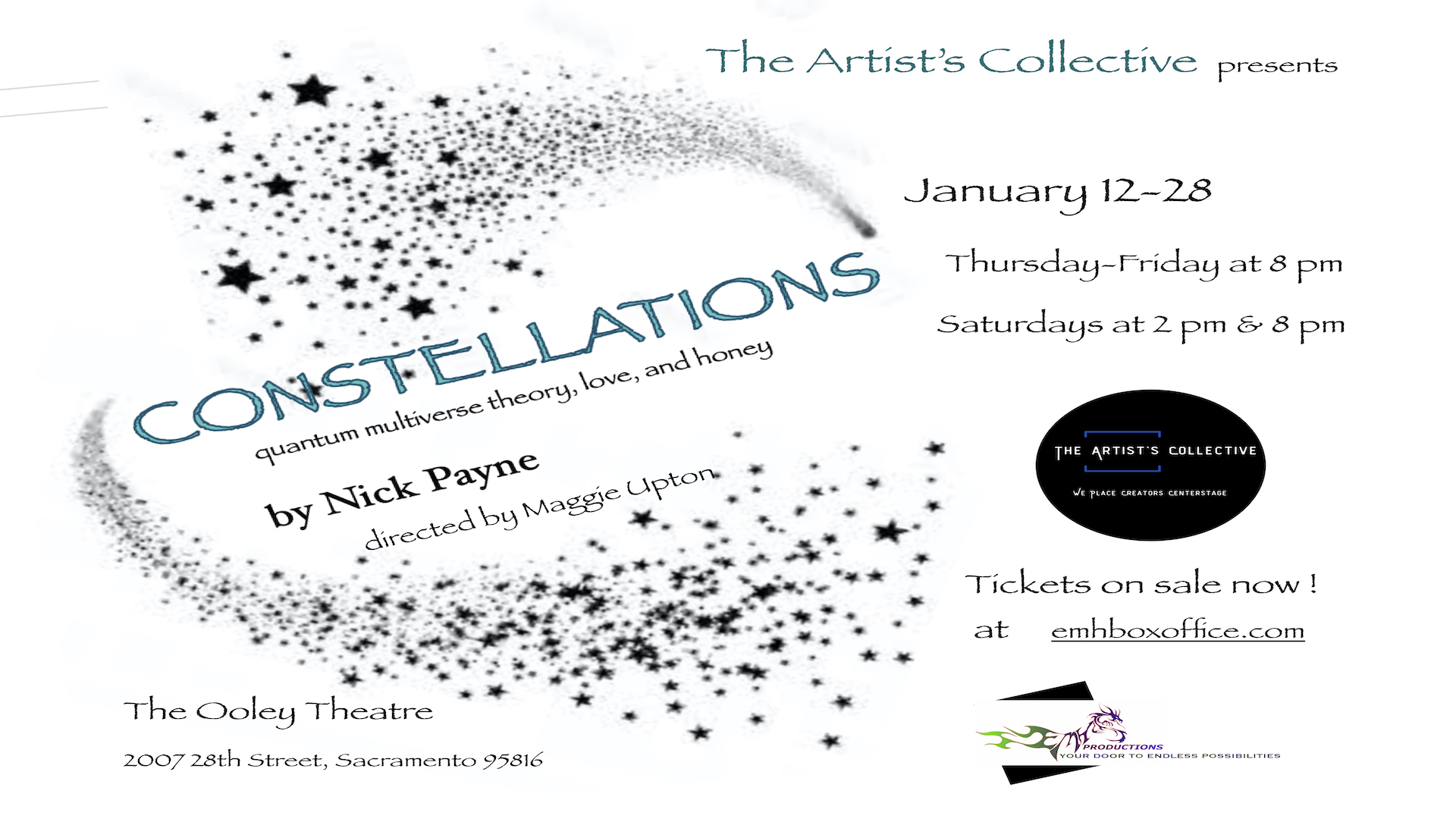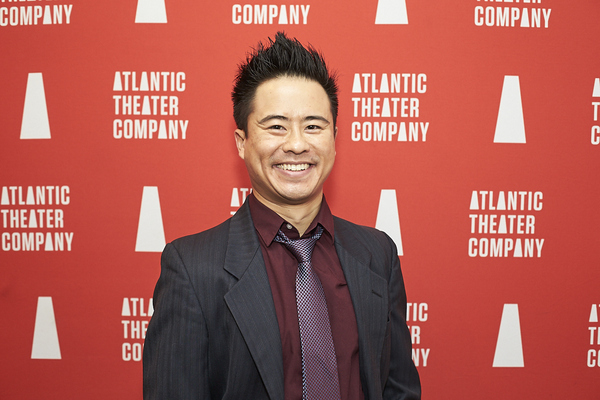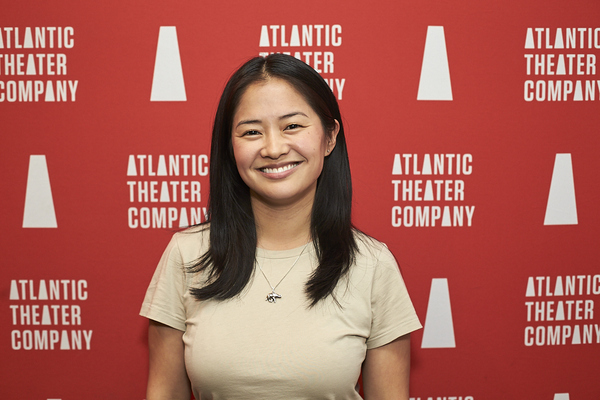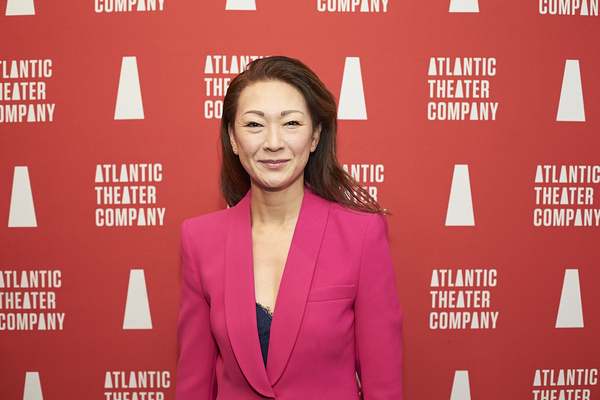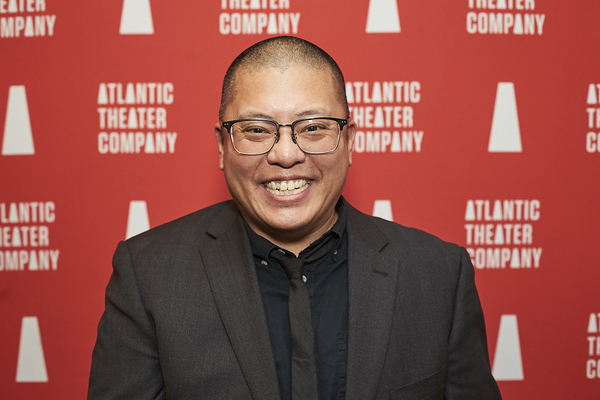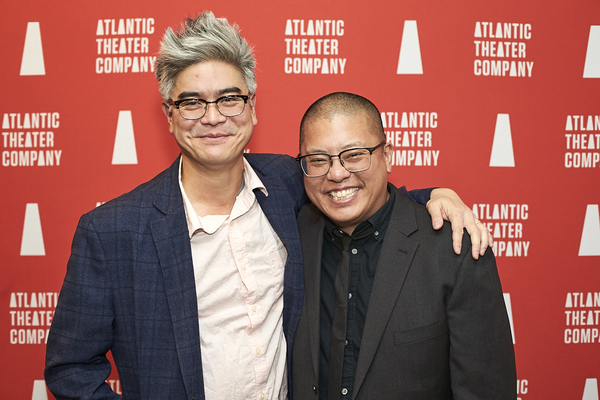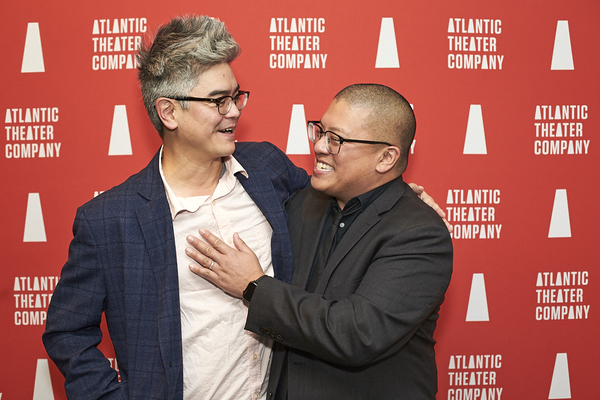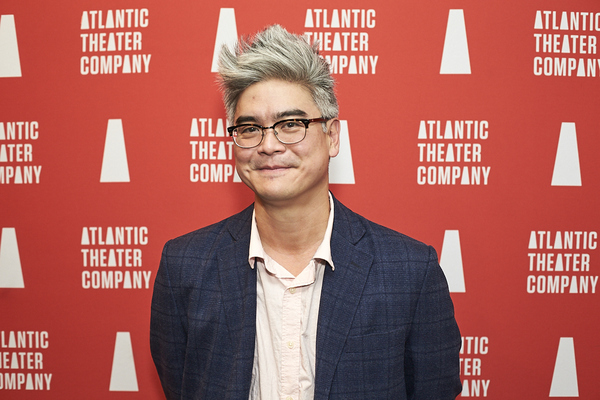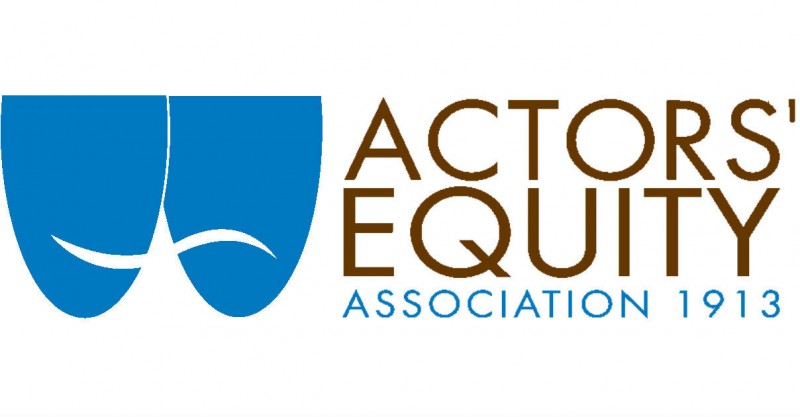
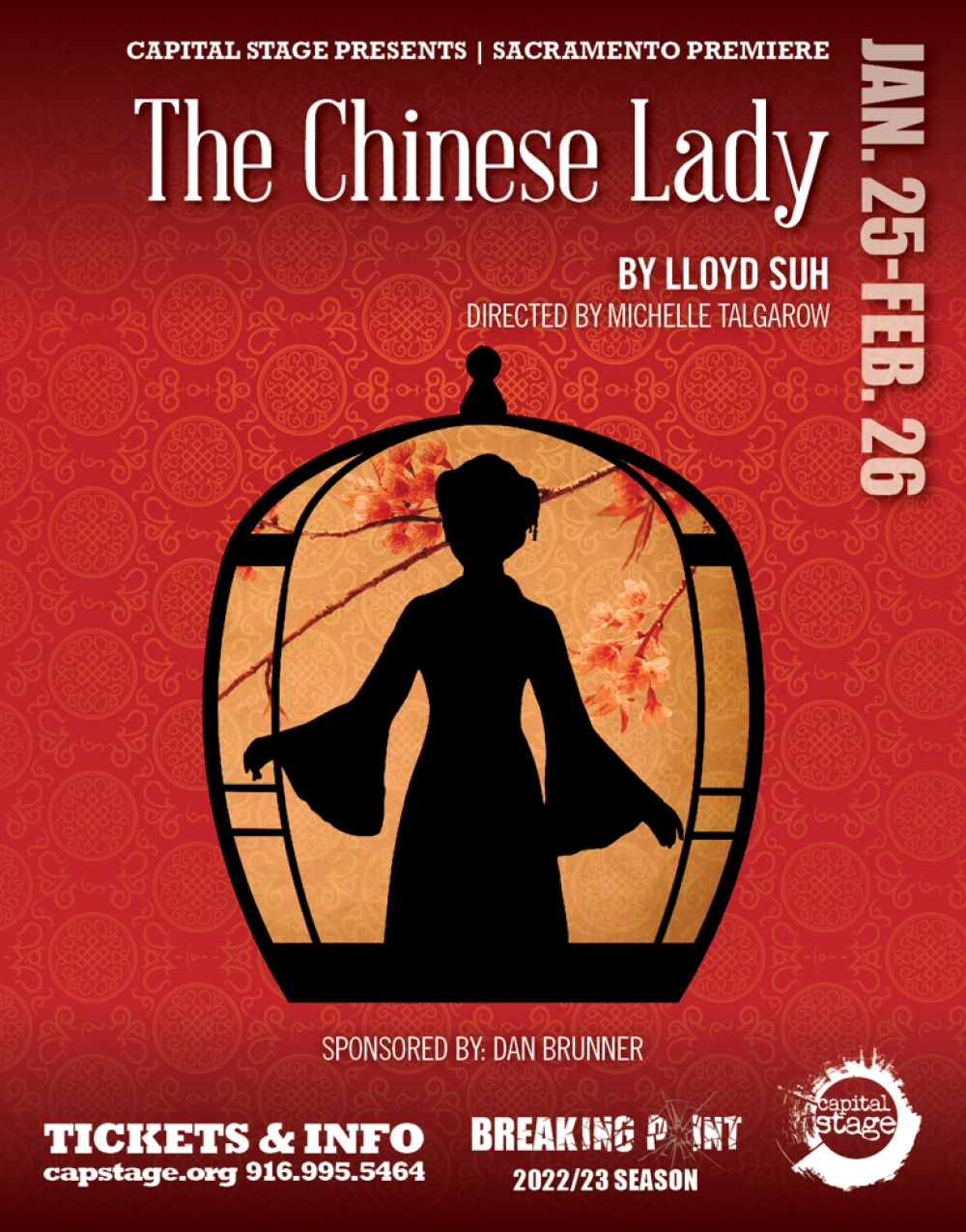
Follow Us:
OUR MISSION
Capital Stage’s mission is to entertain, engage and challenge our audience with bold, thought provoking theatre.
THINGS TO KNOW
COVID-19 SAFETY:
Visit our COVID-19 Safety Protocols & Procedures Page to stay up to date on our Health & Safety requirements and recommendations.
VIDEO/PHOTOS:
Recording and photography of any kind are prohibited at Capital Stage during the performance.
CELL PHONES:
Patrons are asked to turn communication devices off upon entering the theatre.
LATE SEATING & RE-SEATING:
Due to the design of our theatre, we cannot guarantee seating for late arrivals or for patrons who leave the theatre during the performance. As a courtesy to our artists and our audiences, late arrivals will be seated in a suitable location by our staff if possible and at the appropriate intervals.
REFRESHMENTS:
Only concession items purchased in the Wine & Dessert Bar are allowed in the theatre, patio and lobby areas. Yes, you can bring your drinks and snacks into the theatre!
CHILDREN:
Capital Stage is noted for bringing intimate bold productions to our region and we encourage young adults to experience a live performance. Children age sixteen and up are welcome at Capital Stage unless specifically noted in the production’s description.
WHEELCHAIR SEATING:
Seating locations at Capital Stage for patrons using wheelchairs or with limited mobility are located in the first row. Tickets for these seats may be purchased in person or by calling the Box Office at 916-995-5464.
RESTROOMS:
Restroom facilities are located in the lounge behind the Wine & Dessert Bar.
INFORMATION:
Brochures and information about upcoming Capital Stage productions and events are available in the box office or by visiting capstage.org.
Capital Stage is a member of Actors' Equity Association, the Union of Professional Actors and Stage Managers in the United States.
Capital Stage is a member of Theatre Communications Group (TCG), the national organization for the American theatre.
Capital Stage is a member of the National New Play Network, the country’s alliance of leading nonprofit theaters that champion the development, production and continued life of new plays.
Capital Stage is a member of Blue Star Theatres, offering discounts to Military personnel, Military family members, and Veterans.

SDC is the theatrical union that unites, empowers, and protects professional Stage Directors and Choreographers throughout the United States.
Cast
Stop AAPI Hate Resources
ACT NOW
- Click here to donate to the Monterey Park Lunar New Year Victims Fund
- Click here to donate to the Half Moon Bay Victims Fund
- Click here for resources for victims, survivors, and community members
- Click here to contact your elected officials
REPORT
- Encourage those who experience or witness acts of hate towards the Asian American and Pacific Islander communities to report an incident at our website. The reporting form is available in 15 languages, with more on the way. Reporting incidents helps us understand what is happening and allows us to continue to address anti-AAPI racism.
- If you witness an act of hate, whether it be a racist joke online, a derogatory comment by a friend, or a refusal of service, say something. Indicate that such behavior is unacceptable to you. Speak with a manager in a store or restaurant if you witness others experiencing discrimination.
Learn More at: https://stopaapihate.org/
Creative Team
Lloyd Suh
Michelle Talgarow
Michael Stevenson
Keith Riedell
Tony Gabrielson
Melissa Jernigan*
Carlos Llontop
Tricia Tecson
Eunice Kim
Madaline Berger
Ed Lee
Kimberly Taketa
Corey D. Winfield
Samantha McLean Haas
Starr Jiang
Yasmine Salmeron^
Special Thanks
Joe Bertolucci, Affordable Heating & Air, Inc.
Donna Chipps
Di Arie Vineyard & Winery
Mary Goodall
Ted Granier
Jim Hensley, President Abbey Flooring, Inc.
Cameron Hoyt
Jamie Jones
Clara McCoy
Oak Park Brewing Company
John Seto
The Tecson Family
Adam Wiley
Production Staff
Production & Company Manager - TONY GABRIELSON
Technical Director - CARLOS LLONTOP
Scenic Charge Artist - SAMANTHA McLEAN HAAS
Sound Designer & Engineer - ED LEE
Lead Electrician - ANDREW FRIDAE
Stage Manager - MELISSA JERNIGAN*
Production Assistant - YASMINE SALMERON^
Run Crew - MADDIE HARDIMAN
Build Crew - LANA DALLMAN, TED GRANIER, MADDIE HARDIMAN, DEAN KARAGIANES, SUNNY MACKEY, BILL MAI, KURT RODRIGUEZ, YASMINE SALMERON^, IMANI WAWERU^, ALEXANDRIA XIONG
COVID-19 Safety Manager - ELIJAH PETERS
Graphic Designer/Webmaster - MISTY MCDOWELL
Photographer - CHARR CRAIL
BIPOC Liaison - NICOLE ANNE SALLE
^ Capital Stage Apprentice | * Member Actors' Equity Association
Dramaturgy by Starr Jiang
Historical Overview
Afong Moy arrived in America in October 1834. Salem merchants Francis and Nathaniel G. Carnes, along with ship captain Benjamin Obear and his wife Augusta, brought her from Guangzhou, China. They would use her as a marketing ploy to promote the Chinese goods they were selling. To garner attention and attract customers, they created an “exhibition and salon,” using Moy to draw a crowd. The first exhibition and sales campaign with Moy presenting Chinese objects began at Obear’s house in New York City in November 1834. An announcement for the event in the New York Daily-Advertiser reads:
The ship Washington, Capt. Obear, has brought out a beautiful Chinese Lady, called Juila Foochee ching-chang king, daughter of Hong wang-tzang tzee king. As she will see all who are disposed to pay twenty-five cents. She will no doubt have many admirers.
Many newspapers around this time referenced Afong Moy by variations of Chinese gibberish. Stories circulated that she was the daughter of China's elite, although her true origins, like her name, are not known.
On November 6, when lengthy advertisements appeared to announce Moy’s exhibition, Afong Moy’s anglicized Chinese name was replaced with the moniker, Afong Moy. On November 10, 1834, she was exhibited amidst the Carne brothers’ offerings with her translator, Atung, who provided narration about her life in China and commands for her to follow. This included the difficult stroll around the room, as depicted in the play.
From at least May 1835, management of Afong Moy was shifted to Henry Hannington of New York. He had a business producing dioramas in the city. The exact transaction of this indenture from the Carnes and Obear to Hannington is not known. Moy would become less of a marketing tool for selling Chinese goods and instead became the performance and spectacle. Atung’s name also disappeared from advertisements. Whether Atung left of his own volition or Hannington did not want or need to manage him for this act is unknown. Hannington, as well as his wife Catherine, managed the content of the presentation completely. Moy was now paired with other acts, such as a ventriloquist and magician.
Moy was meant to return to China a year after her arrival in the US, her departure initially marked for the spring of 1835. However, her leave was continuously delayed, as her manager realized they could continue to make money off of her appearances. When the Panic of 1837 occurred, the financial collapse resulted in people having less money to spend on entertainment. Those who profited off of Moy totally abandoned and deserted her.
In March 1838, the Monmouth Inquirer published articles locating Afong in Monmouth County, New Jersey. She was living with an indigent widow and her family. In the articles, Afong confirmed that she was brought to America with the promise of a one-year stay. “After her agent could no longer attract the attention of the public, she was brought to this county, and placed under the direction of a widow woman of very indigent circumstances who … is wholly unable to administer to the comforts, and every day wants of her guest.”’ “She [Moy] appears to be much dissatisfied with her present situation and mode of living—her personal treatment we strongly suspect, is not of the most pleasant kind.” The story was picked up by other newspapers who criticized those who abandoned her. “The profits [for her manager] began to decrease and she was finally shamelessly abandoned in Monmouth County in this state, in a helpless situation. She was provided for by the authorities of the county in their poor-house—where she remained…when a company of persons redeemed her, by defraying the expenses of her maintenance.” After the public outcry, Henry Hannington began to contribute $2.50 a week to the family that boarded her. She remained in Monmouth for another eight years.
Then, as a result of P.T Barnum’s connection to Hannington through his work as a painter of signs and decorative paintings for dioramas, Barnum became Moy’s manager and once again objectified her before audiences. Beginning in July 1847 at Niblo’s in New York, she began more years of touring. Moy and Charles Stratton, also called General Tom Thumb, periodically presented together onstage for two years. Spectators would watch her sing a song in Chinese and eat with chopsticks. P.T. Barnum eventually replaced Moy with a younger Chinese woman, Pwan-Ye-Koo, using the false narrative of her aristocratic background to distinguish her from Afong Moy, a “common” woman. After 1851, there are no more known written accounts about Moy. She has not been found in census or death records.
Read more: https://capstage.org/wp-content/uploads/Dramaturgy-for-THE-CHINESE-LADY.pdf
Meet the Company
Rinabeth Apostol*
 Rinabeth is happy to return to Cap Stage after appearing onstage in SMART PEOPLE, VIETGONE and THE GREAT LEAP virtual production. She has appeared in many new works onstage at American Conservatory Theater, Actors Theater of Louisville, Seattle Rep, TheatreWorks, California Shakespeare Theatre, The Magic, Arizona Theater Company, East West Players, Skirball Center for the Arts, and Berkeley Rep Ground Floor, among others. 2021-2022 productions include STARTING HERE, STARTING NOW (SF Playhouse), THE MAGIC LAMP (Presidio Theater), REDWINGED BLACKBIRD (world premiere), FUN HOME (42nd Street Moon), MONUMENT (world premiere, Magic Theater) and co-directing and choreographing over 100+ students in THE LION KING JR. Offstage, she often lends her voice to commercials, video games and children’s toys; and most recently to Sirius XM/Marvel’s UNBEATABLE SQUIRREL GIRL Podcast as Gretchen Campbell. You can also find her as one of only two actors who provided stunt and MoCap work in Marvel’s MIDNIGHT SUNS videogame. She recently completed her residency as The Class of 1939 Artist in Residence and Asian Distinguished Theater Fellow at College of William + Mary and is a proud member of Actors’ Equity, SAG-AFTRA and Ferocious Lotus Theatre Company. Upcoming projects include playing Bloody Mary in SOUTH PACIFIC with the Billings Symphony and the west coast premiere of her solo show little brown gIRL at the Association for Asian American Studies conference this spring. Thru this performance, Rinabeth would like to celebrate her immigrant parents, immigrants and their families, second chances and lost his/herstories. More @rbdtwo or rinabeth.com
Rinabeth is happy to return to Cap Stage after appearing onstage in SMART PEOPLE, VIETGONE and THE GREAT LEAP virtual production. She has appeared in many new works onstage at American Conservatory Theater, Actors Theater of Louisville, Seattle Rep, TheatreWorks, California Shakespeare Theatre, The Magic, Arizona Theater Company, East West Players, Skirball Center for the Arts, and Berkeley Rep Ground Floor, among others. 2021-2022 productions include STARTING HERE, STARTING NOW (SF Playhouse), THE MAGIC LAMP (Presidio Theater), REDWINGED BLACKBIRD (world premiere), FUN HOME (42nd Street Moon), MONUMENT (world premiere, Magic Theater) and co-directing and choreographing over 100+ students in THE LION KING JR. Offstage, she often lends her voice to commercials, video games and children’s toys; and most recently to Sirius XM/Marvel’s UNBEATABLE SQUIRREL GIRL Podcast as Gretchen Campbell. You can also find her as one of only two actors who provided stunt and MoCap work in Marvel’s MIDNIGHT SUNS videogame. She recently completed her residency as The Class of 1939 Artist in Residence and Asian Distinguished Theater Fellow at College of William + Mary and is a proud member of Actors’ Equity, SAG-AFTRA and Ferocious Lotus Theatre Company. Upcoming projects include playing Bloody Mary in SOUTH PACIFIC with the Billings Symphony and the west coast premiere of her solo show little brown gIRL at the Association for Asian American Studies conference this spring. Thru this performance, Rinabeth would like to celebrate her immigrant parents, immigrants and their families, second chances and lost his/herstories. More @rbdtwo or rinabeth.com
Leon Goertzen*
 Leon is thrilled to work with Capital Stage for the first time. He has worked at theaters in the San Francisco Bay Area and Los Angeles, including East West Players, Berkeley Repertory Theatre, Will and Company, Magic Theatre, Asian American Theater Company, Ferocious Lotus Theatre Company (founder and company member), San Francisco Mime Troupe, Road Theatre Company, Cutting Ball Theater, PlayGround, Aurora Theater Company, Bay Area Playwright's Festival, Alcazar Theatre, California Conservatory Theatre, New Conservatory Theater, and Theatre Lunatico. Film credits include QUITTERS and BEAUTY AND THE BLADE. Leon is a graduate of the School of Drama at UNC School of the Arts and is a proud member of Actors' Equity Association, Screen Actors Guild.
Leon is thrilled to work with Capital Stage for the first time. He has worked at theaters in the San Francisco Bay Area and Los Angeles, including East West Players, Berkeley Repertory Theatre, Will and Company, Magic Theatre, Asian American Theater Company, Ferocious Lotus Theatre Company (founder and company member), San Francisco Mime Troupe, Road Theatre Company, Cutting Ball Theater, PlayGround, Aurora Theater Company, Bay Area Playwright's Festival, Alcazar Theatre, California Conservatory Theatre, New Conservatory Theater, and Theatre Lunatico. Film credits include QUITTERS and BEAUTY AND THE BLADE. Leon is a graduate of the School of Drama at UNC School of the Arts and is a proud member of Actors' Equity Association, Screen Actors Guild.
Lloyd Suh
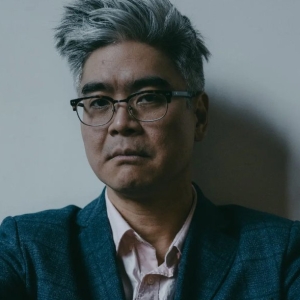 Lloyd Suh is the author of AMERICAN HWANGAP, THE WONG KIDS IN THE SECRET OF THE SPACE CHUPACABRA GO!, JESUS IN INDIA, GREAT WALL STORY, THE CHILDREN OF VONDERLY, MASHA NO HOME and others, produced with Ma-Yi, The Play Company, Ensemble Studio Theatre, La Mama ETC, Magic Theatre (SF), Denver Center Theatre Company, East West Players (LA), and internationally at the Cultural Center of the Philippines in Manila, and with PCPA in Seoul, Korea. He has received support from the NEA Arena Stage New Play Development program, the Andrew W. Mellon Launching New Plays Into the Repertoire initiative via the Lark Play Development Center, and the New York State Council on the Arts, Jerome Foundation, Theatre Communications Group and Dramatists Guild. His plays have been published by Samuel French, Playscripts, Smith & Kraus, Duke University Press and American Theater magazine. He is an alum of EST's Youngblood and the Soho Rep Writer Director Lab, and from 2005-2010 served as Artistic Director of Second Generation and Co-Director of the Ma-Yi Writers Lab. He has served since 2011 as the Director of Onsite Programs at the Lark.
Lloyd Suh is the author of AMERICAN HWANGAP, THE WONG KIDS IN THE SECRET OF THE SPACE CHUPACABRA GO!, JESUS IN INDIA, GREAT WALL STORY, THE CHILDREN OF VONDERLY, MASHA NO HOME and others, produced with Ma-Yi, The Play Company, Ensemble Studio Theatre, La Mama ETC, Magic Theatre (SF), Denver Center Theatre Company, East West Players (LA), and internationally at the Cultural Center of the Philippines in Manila, and with PCPA in Seoul, Korea. He has received support from the NEA Arena Stage New Play Development program, the Andrew W. Mellon Launching New Plays Into the Repertoire initiative via the Lark Play Development Center, and the New York State Council on the Arts, Jerome Foundation, Theatre Communications Group and Dramatists Guild. His plays have been published by Samuel French, Playscripts, Smith & Kraus, Duke University Press and American Theater magazine. He is an alum of EST's Youngblood and the Soho Rep Writer Director Lab, and from 2005-2010 served as Artistic Director of Second Generation and Co-Director of the Ma-Yi Writers Lab. He has served since 2011 as the Director of Onsite Programs at the Lark.
Michelle Talgarow
 Michelle (she/hers) is thrilled to be back at Capital Stage with a director’s cap on. She performed in Capital Stage’s production of VIETGONE in 2019. Michelle is a Kalmyk/Filipina theatre maker in the Bay Area for over 25 years. Her most recent directing credits are, MAN OF GOD with Shotgun Players in Berkeley where she is also an artistic company member, and BALIKBAYAN BOX with TheatreFIRST, written by Jeffrey Lo, director of VIETGONE. Michelle is also a proud member of the all AAPI Bay Area theatre collective, Ferocious Lotus. Michelle is currently an adjunct professor at University of San Francisco.
Michelle (she/hers) is thrilled to be back at Capital Stage with a director’s cap on. She performed in Capital Stage’s production of VIETGONE in 2019. Michelle is a Kalmyk/Filipina theatre maker in the Bay Area for over 25 years. Her most recent directing credits are, MAN OF GOD with Shotgun Players in Berkeley where she is also an artistic company member, and BALIKBAYAN BOX with TheatreFIRST, written by Jeffrey Lo, director of VIETGONE. Michelle is also a proud member of the all AAPI Bay Area theatre collective, Ferocious Lotus. Michelle is currently an adjunct professor at University of San Francisco.
Michael Stevenson
Keith Riedell
Tony Gabrielson
Melissa Jernigan*
 Melissa most recently worked at Capital Stage on THE ROYALE, THE LIFESPAN OF A FACT, PASS OVER, MISS BENNET and HOLD THESE TRUTHS, and has been stage managing at Capital Stage since 2016: Some of her other favorites include VIETGONE, THE NETHER, AN OCTOROON, AND STUPID F##KING BIRD. Other theatrical credits include Production Assisting on Broadway’s LENNON, Off-Broadway: FELA! the Lagos Tour, David Cromer’s OUR TOWN, John Leguizamo: A WORK IN PROGRESS, BEAUTY OF THE FATHER at Manhattan Theatre Club, BREATH & IMAGINATION at Hartford Stage, OUR TOWN starring Helen Hunt at The Broad Theatre in Santa Monica and THE LASSO OF TRUTH at Marin Theatre Company. This past year she was a sub stage manager on Harry Potter and the Cursed Child in SF. She is a proud Equity Member. When she’s not inside the stage management booth Melissa enjoys spending time with her Husband, two sons and 10 chickens. For Lola.
Melissa most recently worked at Capital Stage on THE ROYALE, THE LIFESPAN OF A FACT, PASS OVER, MISS BENNET and HOLD THESE TRUTHS, and has been stage managing at Capital Stage since 2016: Some of her other favorites include VIETGONE, THE NETHER, AN OCTOROON, AND STUPID F##KING BIRD. Other theatrical credits include Production Assisting on Broadway’s LENNON, Off-Broadway: FELA! the Lagos Tour, David Cromer’s OUR TOWN, John Leguizamo: A WORK IN PROGRESS, BEAUTY OF THE FATHER at Manhattan Theatre Club, BREATH & IMAGINATION at Hartford Stage, OUR TOWN starring Helen Hunt at The Broad Theatre in Santa Monica and THE LASSO OF TRUTH at Marin Theatre Company. This past year she was a sub stage manager on Harry Potter and the Cursed Child in SF. She is a proud Equity Member. When she’s not inside the stage management booth Melissa enjoys spending time with her Husband, two sons and 10 chickens. For Lola.
Carlos Llontop
Tricia Tecson
Eunice Kim
Madaline Berger
Ed Lee
Kimberly Taketa
Corey D. Winfield
Samantha McLean Haas
Starr Jiang
Yasmine Salmeron^
Articles
Photos: Go Inside Opening Night of THE FAR COUNTRY at Atlantic Theater Company
Last night (December 5), Atlantic Theater Company celebrated the Opening Night of The Far Country, an Atlantic commissioned world premiere play by Lloyd Suh, directed by Eric Ting.
See photos from opening night below!
The Far Country is now open and playing a limited engagement through Sunday, January 1st, 2023 Off-Broadway at the Linda Gross Theater (336 West 20th Street).
The Far Country features Ben Chase (Mondo Tragic), Jinn S. Kim (Race, Religion & Politics), Whit K. Lee (Assassins), Christopher Liam Moore (All The Way), Shannon Tyo (The Chinese Lady), Amy Kim Waschke (Off-Broadway debut), and Eric Yang (Legacy).
An intimate epic that follows an unlikely family's journey from rural Taishan to the wild west of California in the wake of the Chinese Exclusion Act.
The Far Country features scenic design by Clint Ramos, costume design by Junghyun Georgia Lee, lighting design by Jiyoun Chang, sound design by Fan Zhang, wigs, hair and makeup by Tommy Kurzman, and casting by The Telsey Office: William Cantler, CSA; Karyn Casl, CSA; Destiny Lilly, CSA. Alyssa K. Howard will serve as production stage manager.
Photo credit: Gregory Costanzo
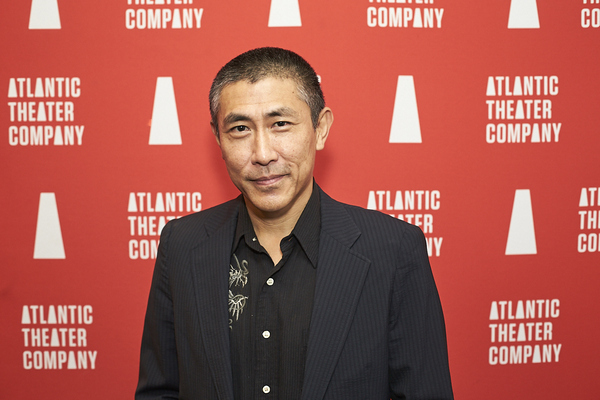
Jinn S. Kim
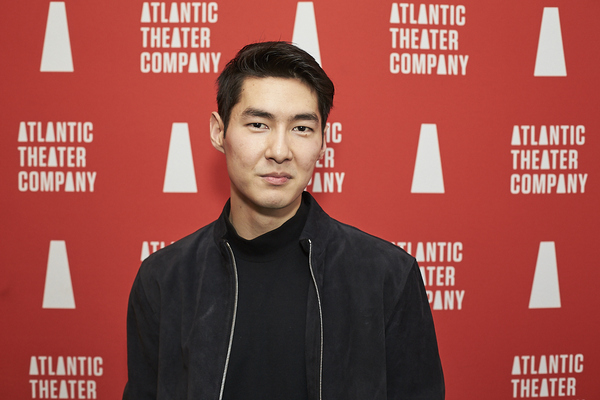
Eric Yang
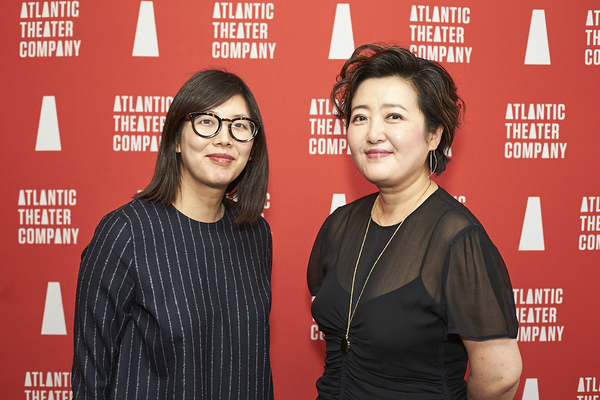
Christine Mok and Junghyun Georgia Lee
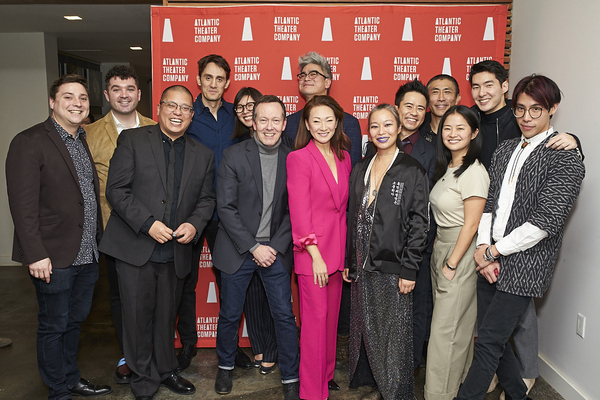
The cast and creative team of The Far Country
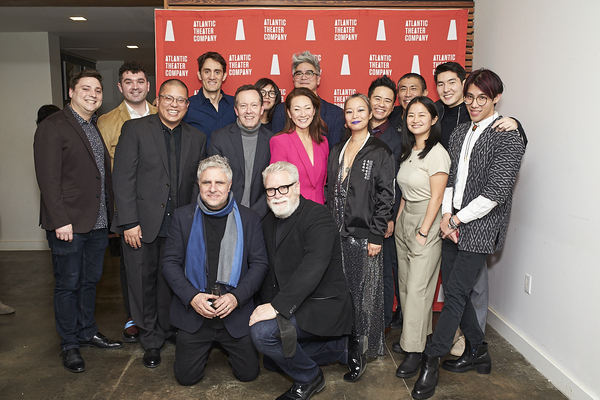
The cast and creative team of The Far Country with Neil Pepe and Jeffory Lawson
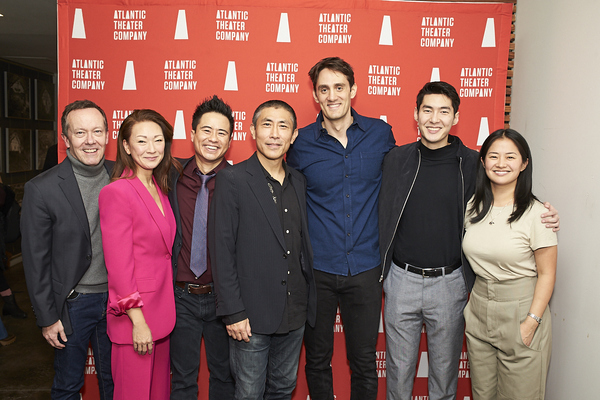
Christopher Liam Moore, Amy Kim Waschke, Whit K. Lee, Jinn S. Kim , Ben Chase, Eric Yang and Shannon Tyo
Review Roundup: THE FAR COUNTRY Opens At Atlantic Theater Company
Atlantic Theater Company just celebrated opening night of the world premiere production of The Far Country, an Atlantic commissioned play by Guggenheim fellow Lloyd Suh, directed by Obie Award winner Eric Ting. The Far Country is a limited engagement running through Sunday, January 1st, 2023 Off-Broadway at the Linda Gross Theater (336 West 20th Street).
The Far Country features Ben Chase (Mondo Tragic), Jinn S. Kim (Race, Religion & Politics), Whit K. Lee (Assassins), Christopher Liam Moore (All The Way), Shannon Tyo (The Chinese Lady), Amy Kim Waschke (Off-Broadway debut), and Eric Yang (Legacy).
An intimate epic that follows an unlikely family's journey from rural Taishan to the wild west of California in the wake of the Chinese Exclusion Act.
Read the reviews!
Alexis Soloski, The New York Times: “The Far Country” ends in 1930. That ending isn’t necessarily abrupt. But it does feel somewhat arbitrary. Why not 1950? Or 1970? There is so much more history to recover. More love. More promise. More pain. Moon Gyet claims that the strenuous physical labor required of an immigrant is nothing compared with the work of being Chinese in America. This takes patience and focus, he says. A serious mind and a necessary grace. Suh possesses these qualities in full. He has more work to do, more stories to tell.
Robert Hofler, The Wrap: Eric Ting’s direction is effective when the play is on track. When “The Far Country” goes awry, he leaves his audience lost in the San Francisco fog.
Joe Dziemianowicz, New York Theatre Guide: One of Suh’s strengths is his ability to mix realism and poetic elements. He uses that here as he shines a light on a dark slice of American history and builds a play around it. The timeline could be clearer, along with an indication of why these Chinese men and women risked so much to be in the U.S. They faced so many hardships there. In this Atlantic Theater Company presentation, director Eric Ting guides a uniformly excellent cast. Tyo, seen previously in Suh's The Chinese Lady, about a different fraught journey from Asia to America, arrives well into the play and shifts the story into high gear. There’s fine work by the design team, including Clint Ramos, whose spare but striking set reveals some surprise elements the director employs. So why were actors suddenly standing up to their ankles in water? I have no idea, and that’s no lie.
Melissa Rose Bernardo, Time Out New York: In his 2018 play The Chinese Lady, Lloyd Suh introduced us to Afong Moy, reportedly the first Chinese woman to set foot in the U.S., who was displayed like a curio for paying audiences. In The Far Country, whose premiere at the Atlantic is directed by Eric Ting, he digs into a later period of Asian-American history: the aftermath of 1882’s Chinese Exclusion Act. But this is no staid history class. In just over two hours, Suh succinctly and humorously covers 21 years, two continents, two interrogations and two obscenely expensive trans-Pacific crossings from Taishan to San Francisco.
ACTORS’ EQUITY ASSOCIATION (AEA)
Founded in 1913, this union represents more than 45,000 actors and stage managers in the United States. Equity seeks to advance, promote and foster the art of live theatre as an essential component of our society. Equity negotiates wages and working conditions, providing a wide range of benefits, including health and pension plans. AEA is a member of the AFL-CIO, and is affiliated with FIA, an international organization of performing arts unions. The Equity emblem is our mark of excellence.
Capital Stage Staff
MICHAEL STEVENSON - Artistic Director
KEITH RIEDELL - Managing Director
TONY GABRIELSON - Production & Company Manager
MISTY MCDOWELL - Marketing Manager
AALIYAH PETERS - Audience Services Manager
CARLOS LLONTOP - Technical Director
ED LEE - Resident Sound Designer & Engineer
ANDREW FRIDAE - Carpenter, Technician
LOGAN HELLER – Box Office Associate, Apprentice Coordinator
CECILIA CASTILLO JUAREZ - Concessions Associate
JAMIE JONES, PETER MOHRMANN, GAIL RUSSELL, JANIS STEVENS – Associate Artists
IMANI WAWERU, LANA DALLMANN, YASMINE SALMERON - Apprentices
ELIJAH PETERS - COVID Safety Officer
Capital Stage Board Members
Chastity E. Benson
California State Association of Counties
Dan Brunner, Treasurer
Arts Patron
Melissa Conner
Seed Communications Design
Kathryn E. Doi
Hanson Bridgett LLP
Sherry Hartel Haus
Downey Brand
Steve Koonce
Arts Patron
Kris Martin
Arts Patron
Kristi Quesada Mathisen
Sacramento Country Day School
Lori Abbott Moreland
Arts Patron
Damaris L. Perez
Crowe LLP
Vince Sales
Everyday Impact Consulting
Mike Tentis, Board President
University of the Pacific
Peggy Wheeler
California Hospital Association
Board Emeritus:
Stephanie Gularte, Founding Artistic Director
Capital Stage
Peter Mohrmann, Co-founder
Capital Stage
Jonathan Williams, Co-Founder
Capital Stage
Clif McFarland
Mitchell Chadwick
Arlen Orchard
SMUD
Julie Stark
Arts Patron










